Digitalisation Impact on Finance and Accounting: A Literature Review
VerifiedAdded on 2021/06/18
|10
|2276
|203
Report
AI Summary
This report provides a comprehensive literature review on the impact of digitalization on accounting and finance. It examines common themes across multiple academic articles, including the benefits to accountants, the risks of cyber security, and the influence of cloud computing. The report also explores the different themes, such as resistance from CFOs, the growth of the internet economy, and changes in social order. Furthermore, it discusses the future of finance and accounts in the era of technology, managerial implications, and the limitations of the studies. The analysis highlights the challenges and opportunities presented by digital transformation, emphasizing the need for CFOs to adapt to the evolving landscape and the importance of addressing limitations in existing research. Overall, the report underscores the significant and multifaceted effects of digitalization on the finance and accounting professions.
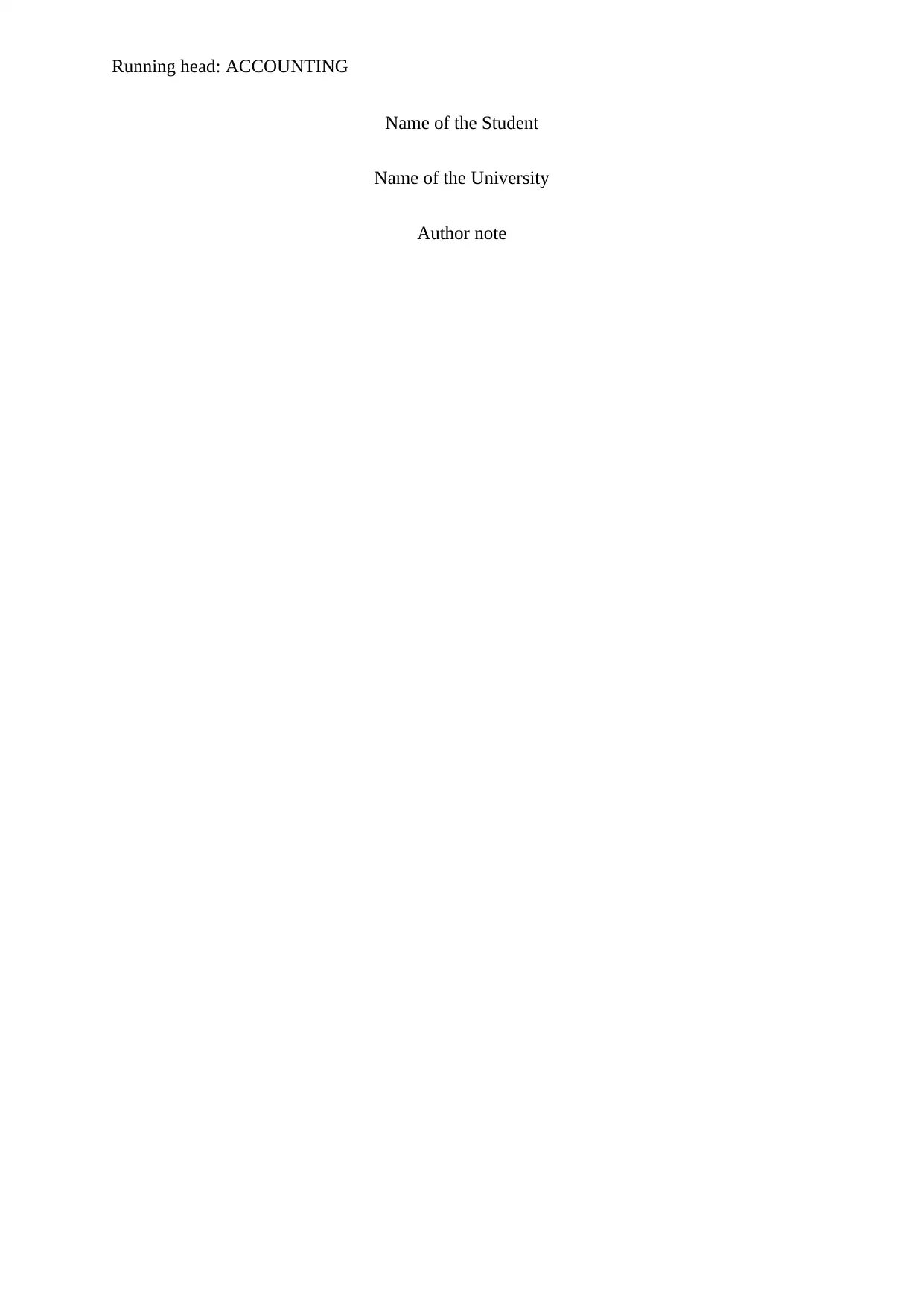
Running head: ACCOUNTING
Name of the Student
Name of the University
Author note
Name of the Student
Name of the University
Author note
Paraphrase This Document
Need a fresh take? Get an instant paraphrase of this document with our AI Paraphraser
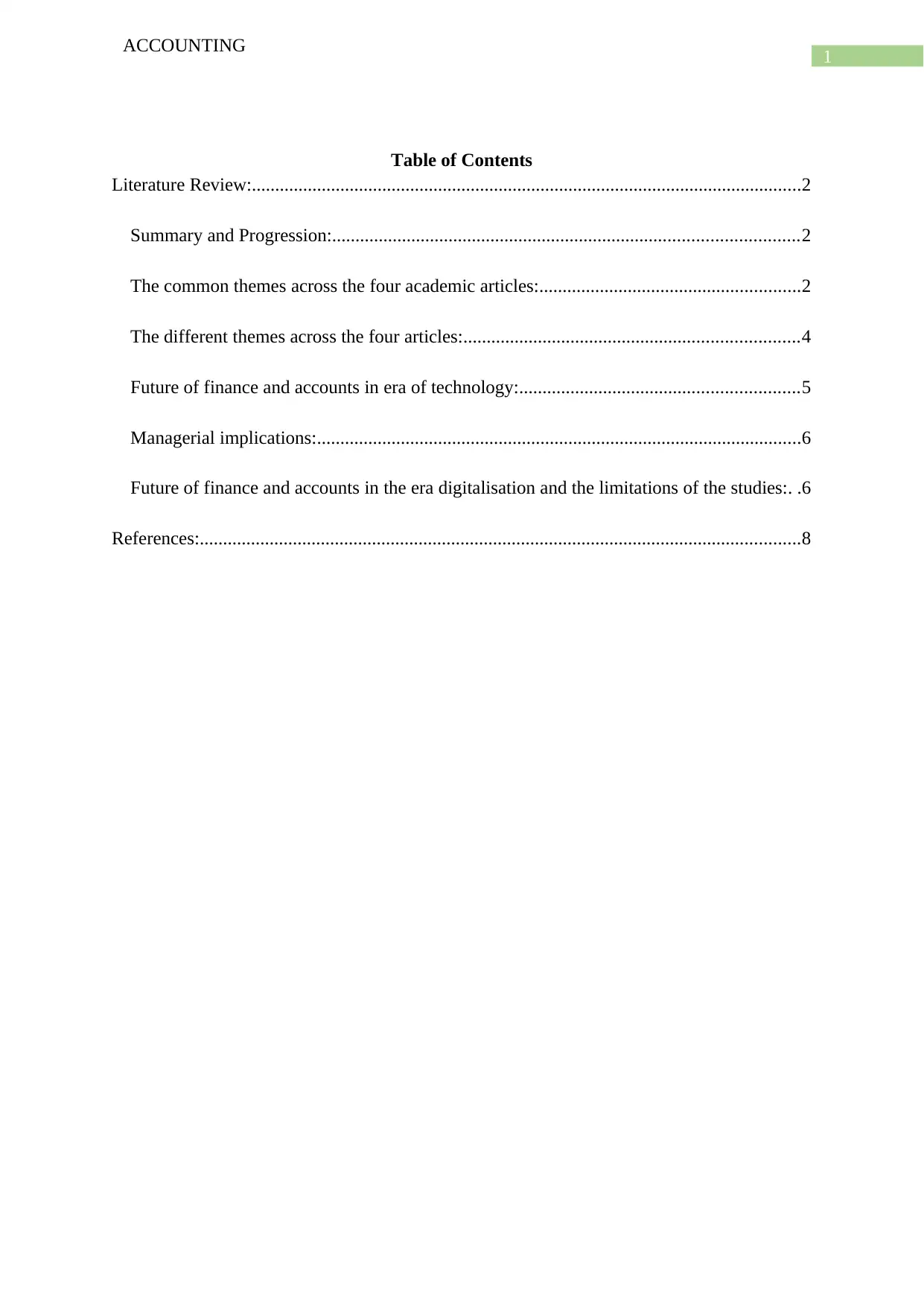
1
ACCOUNTING
Table of Contents
Literature Review:......................................................................................................................2
Summary and Progression:....................................................................................................2
The common themes across the four academic articles:........................................................2
The different themes across the four articles:........................................................................4
Future of finance and accounts in era of technology:............................................................5
Managerial implications:........................................................................................................6
Future of finance and accounts in the era digitalisation and the limitations of the studies:. .6
References:.................................................................................................................................8
ACCOUNTING
Table of Contents
Literature Review:......................................................................................................................2
Summary and Progression:....................................................................................................2
The common themes across the four academic articles:........................................................2
The different themes across the four articles:........................................................................4
Future of finance and accounts in era of technology:............................................................5
Managerial implications:........................................................................................................6
Future of finance and accounts in the era digitalisation and the limitations of the studies:. .6
References:.................................................................................................................................8
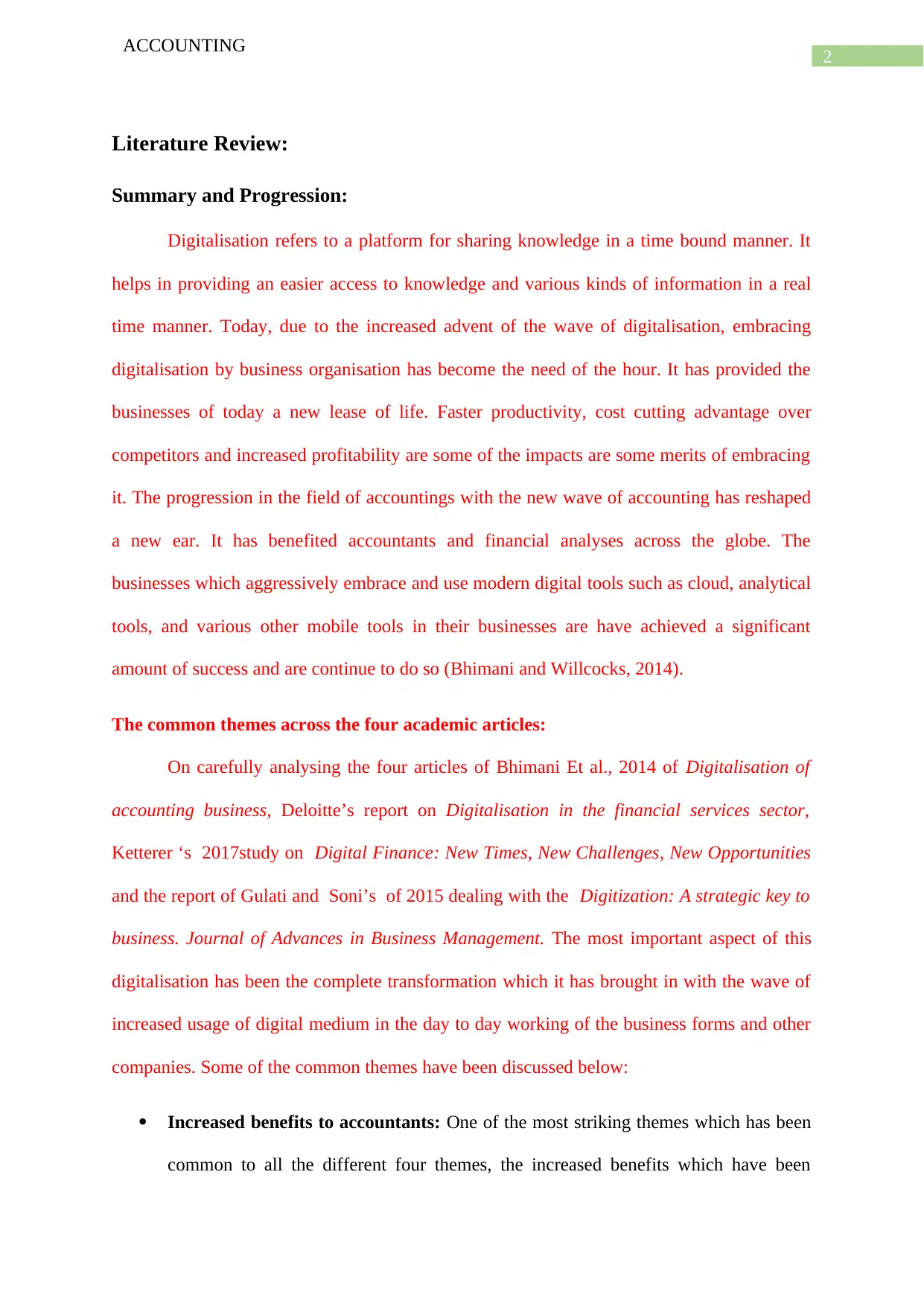
2
ACCOUNTING
Literature Review:
Summary and Progression:
Digitalisation refers to a platform for sharing knowledge in a time bound manner. It
helps in providing an easier access to knowledge and various kinds of information in a real
time manner. Today, due to the increased advent of the wave of digitalisation, embracing
digitalisation by business organisation has become the need of the hour. It has provided the
businesses of today a new lease of life. Faster productivity, cost cutting advantage over
competitors and increased profitability are some of the impacts are some merits of embracing
it. The progression in the field of accountings with the new wave of accounting has reshaped
a new ear. It has benefited accountants and financial analyses across the globe. The
businesses which aggressively embrace and use modern digital tools such as cloud, analytical
tools, and various other mobile tools in their businesses are have achieved a significant
amount of success and are continue to do so (Bhimani and Willcocks, 2014).
The common themes across the four academic articles:
On carefully analysing the four articles of Bhimani Et al., 2014 of Digitalisation of
accounting business, Deloitte’s report on Digitalisation in the financial services sector,
Ketterer ‘s 2017study on Digital Finance: New Times, New Challenges, New Opportunities
and the report of Gulati and Soni’s of 2015 dealing with the Digitization: A strategic key to
business. Journal of Advances in Business Management. The most important aspect of this
digitalisation has been the complete transformation which it has brought in with the wave of
increased usage of digital medium in the day to day working of the business forms and other
companies. Some of the common themes have been discussed below:
Increased benefits to accountants: One of the most striking themes which has been
common to all the different four themes, the increased benefits which have been
ACCOUNTING
Literature Review:
Summary and Progression:
Digitalisation refers to a platform for sharing knowledge in a time bound manner. It
helps in providing an easier access to knowledge and various kinds of information in a real
time manner. Today, due to the increased advent of the wave of digitalisation, embracing
digitalisation by business organisation has become the need of the hour. It has provided the
businesses of today a new lease of life. Faster productivity, cost cutting advantage over
competitors and increased profitability are some of the impacts are some merits of embracing
it. The progression in the field of accountings with the new wave of accounting has reshaped
a new ear. It has benefited accountants and financial analyses across the globe. The
businesses which aggressively embrace and use modern digital tools such as cloud, analytical
tools, and various other mobile tools in their businesses are have achieved a significant
amount of success and are continue to do so (Bhimani and Willcocks, 2014).
The common themes across the four academic articles:
On carefully analysing the four articles of Bhimani Et al., 2014 of Digitalisation of
accounting business, Deloitte’s report on Digitalisation in the financial services sector,
Ketterer ‘s 2017study on Digital Finance: New Times, New Challenges, New Opportunities
and the report of Gulati and Soni’s of 2015 dealing with the Digitization: A strategic key to
business. Journal of Advances in Business Management. The most important aspect of this
digitalisation has been the complete transformation which it has brought in with the wave of
increased usage of digital medium in the day to day working of the business forms and other
companies. Some of the common themes have been discussed below:
Increased benefits to accountants: One of the most striking themes which has been
common to all the different four themes, the increased benefits which have been
⊘ This is a preview!⊘
Do you want full access?
Subscribe today to unlock all pages.

Trusted by 1+ million students worldwide
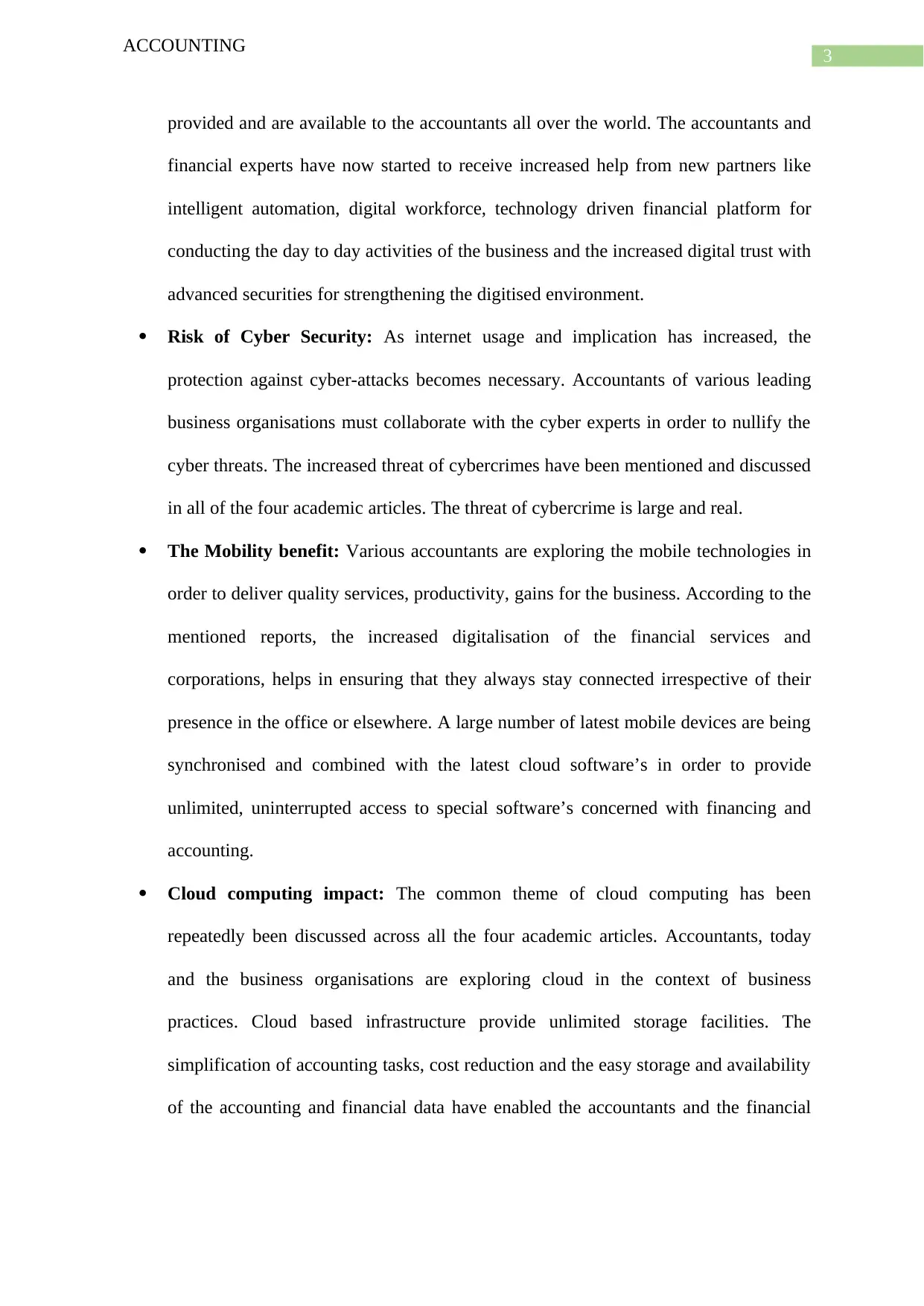
3
ACCOUNTING
provided and are available to the accountants all over the world. The accountants and
financial experts have now started to receive increased help from new partners like
intelligent automation, digital workforce, technology driven financial platform for
conducting the day to day activities of the business and the increased digital trust with
advanced securities for strengthening the digitised environment.
Risk of Cyber Security: As internet usage and implication has increased, the
protection against cyber-attacks becomes necessary. Accountants of various leading
business organisations must collaborate with the cyber experts in order to nullify the
cyber threats. The increased threat of cybercrimes have been mentioned and discussed
in all of the four academic articles. The threat of cybercrime is large and real.
The Mobility benefit: Various accountants are exploring the mobile technologies in
order to deliver quality services, productivity, gains for the business. According to the
mentioned reports, the increased digitalisation of the financial services and
corporations, helps in ensuring that they always stay connected irrespective of their
presence in the office or elsewhere. A large number of latest mobile devices are being
synchronised and combined with the latest cloud software’s in order to provide
unlimited, uninterrupted access to special software’s concerned with financing and
accounting.
Cloud computing impact: The common theme of cloud computing has been
repeatedly been discussed across all the four academic articles. Accountants, today
and the business organisations are exploring cloud in the context of business
practices. Cloud based infrastructure provide unlimited storage facilities. The
simplification of accounting tasks, cost reduction and the easy storage and availability
of the accounting and financial data have enabled the accountants and the financial
ACCOUNTING
provided and are available to the accountants all over the world. The accountants and
financial experts have now started to receive increased help from new partners like
intelligent automation, digital workforce, technology driven financial platform for
conducting the day to day activities of the business and the increased digital trust with
advanced securities for strengthening the digitised environment.
Risk of Cyber Security: As internet usage and implication has increased, the
protection against cyber-attacks becomes necessary. Accountants of various leading
business organisations must collaborate with the cyber experts in order to nullify the
cyber threats. The increased threat of cybercrimes have been mentioned and discussed
in all of the four academic articles. The threat of cybercrime is large and real.
The Mobility benefit: Various accountants are exploring the mobile technologies in
order to deliver quality services, productivity, gains for the business. According to the
mentioned reports, the increased digitalisation of the financial services and
corporations, helps in ensuring that they always stay connected irrespective of their
presence in the office or elsewhere. A large number of latest mobile devices are being
synchronised and combined with the latest cloud software’s in order to provide
unlimited, uninterrupted access to special software’s concerned with financing and
accounting.
Cloud computing impact: The common theme of cloud computing has been
repeatedly been discussed across all the four academic articles. Accountants, today
and the business organisations are exploring cloud in the context of business
practices. Cloud based infrastructure provide unlimited storage facilities. The
simplification of accounting tasks, cost reduction and the easy storage and availability
of the accounting and financial data have enabled the accountants and the financial
Paraphrase This Document
Need a fresh take? Get an instant paraphrase of this document with our AI Paraphraser
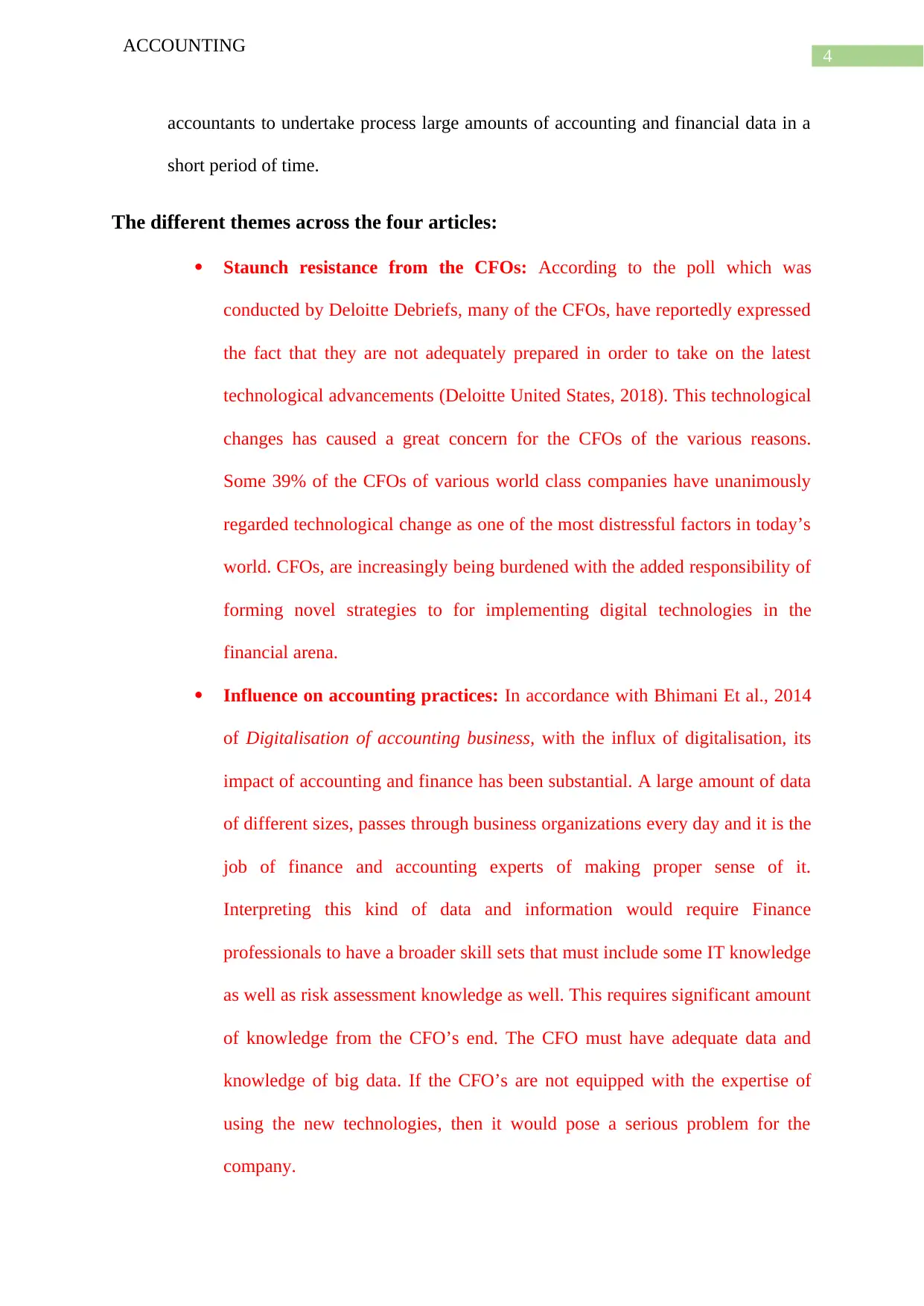
4
ACCOUNTING
accountants to undertake process large amounts of accounting and financial data in a
short period of time.
The different themes across the four articles:
Staunch resistance from the CFOs: According to the poll which was
conducted by Deloitte Debriefs, many of the CFOs, have reportedly expressed
the fact that they are not adequately prepared in order to take on the latest
technological advancements (Deloitte United States, 2018). This technological
changes has caused a great concern for the CFOs of the various reasons.
Some 39% of the CFOs of various world class companies have unanimously
regarded technological change as one of the most distressful factors in today’s
world. CFOs, are increasingly being burdened with the added responsibility of
forming novel strategies to for implementing digital technologies in the
financial arena.
Influence on accounting practices: In accordance with Bhimani Et al., 2014
of Digitalisation of accounting business, with the influx of digitalisation, its
impact of accounting and finance has been substantial. A large amount of data
of different sizes, passes through business organizations every day and it is the
job of finance and accounting experts of making proper sense of it.
Interpreting this kind of data and information would require Finance
professionals to have a broader skill sets that must include some IT knowledge
as well as risk assessment knowledge as well. This requires significant amount
of knowledge from the CFO’s end. The CFO must have adequate data and
knowledge of big data. If the CFO’s are not equipped with the expertise of
using the new technologies, then it would pose a serious problem for the
company.
ACCOUNTING
accountants to undertake process large amounts of accounting and financial data in a
short period of time.
The different themes across the four articles:
Staunch resistance from the CFOs: According to the poll which was
conducted by Deloitte Debriefs, many of the CFOs, have reportedly expressed
the fact that they are not adequately prepared in order to take on the latest
technological advancements (Deloitte United States, 2018). This technological
changes has caused a great concern for the CFOs of the various reasons.
Some 39% of the CFOs of various world class companies have unanimously
regarded technological change as one of the most distressful factors in today’s
world. CFOs, are increasingly being burdened with the added responsibility of
forming novel strategies to for implementing digital technologies in the
financial arena.
Influence on accounting practices: In accordance with Bhimani Et al., 2014
of Digitalisation of accounting business, with the influx of digitalisation, its
impact of accounting and finance has been substantial. A large amount of data
of different sizes, passes through business organizations every day and it is the
job of finance and accounting experts of making proper sense of it.
Interpreting this kind of data and information would require Finance
professionals to have a broader skill sets that must include some IT knowledge
as well as risk assessment knowledge as well. This requires significant amount
of knowledge from the CFO’s end. The CFO must have adequate data and
knowledge of big data. If the CFO’s are not equipped with the expertise of
using the new technologies, then it would pose a serious problem for the
company.
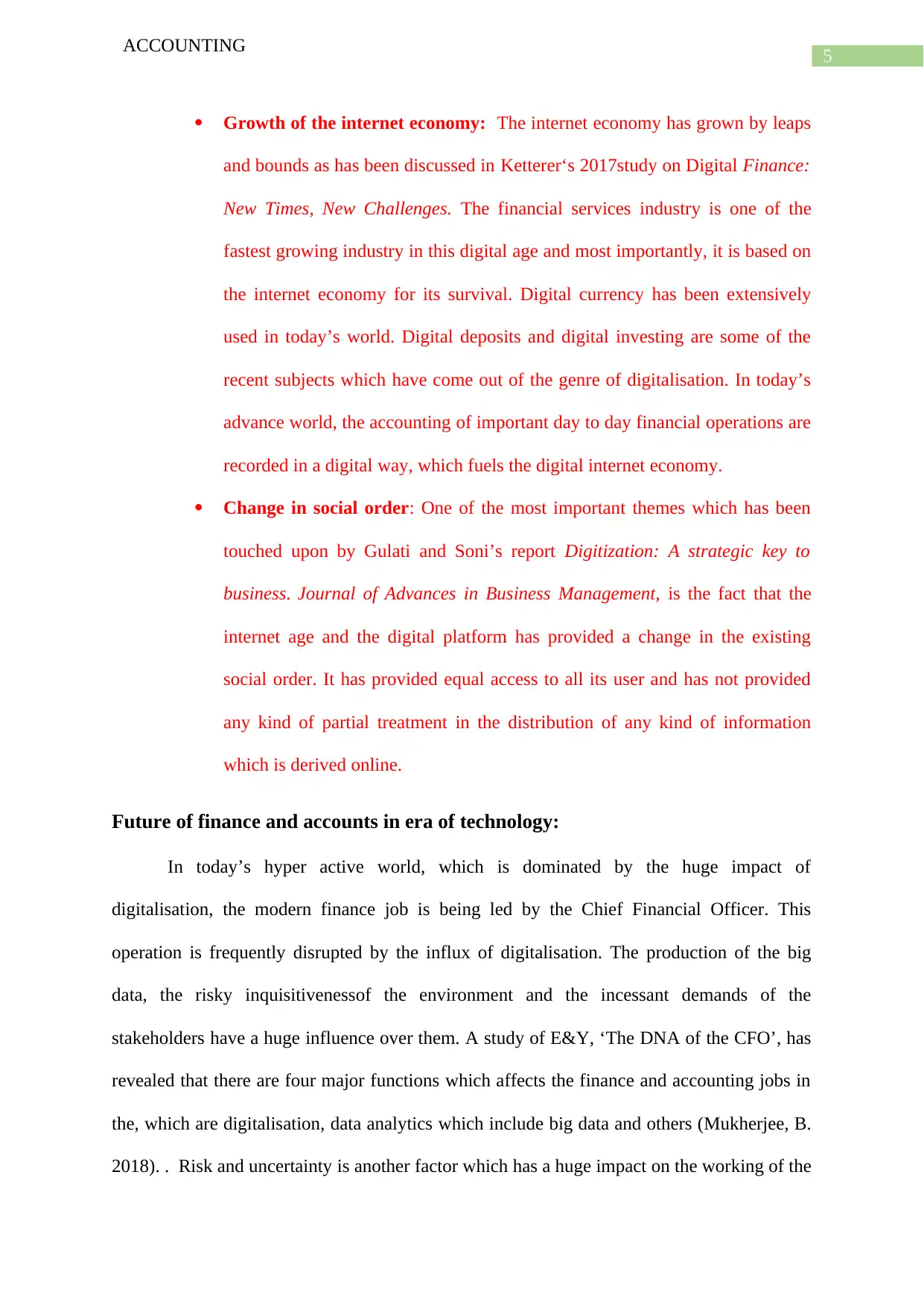
5
ACCOUNTING
Growth of the internet economy: The internet economy has grown by leaps
and bounds as has been discussed in Ketterer‘s 2017study on Digital Finance:
New Times, New Challenges. The financial services industry is one of the
fastest growing industry in this digital age and most importantly, it is based on
the internet economy for its survival. Digital currency has been extensively
used in today’s world. Digital deposits and digital investing are some of the
recent subjects which have come out of the genre of digitalisation. In today’s
advance world, the accounting of important day to day financial operations are
recorded in a digital way, which fuels the digital internet economy.
Change in social order: One of the most important themes which has been
touched upon by Gulati and Soni’s report Digitization: A strategic key to
business. Journal of Advances in Business Management, is the fact that the
internet age and the digital platform has provided a change in the existing
social order. It has provided equal access to all its user and has not provided
any kind of partial treatment in the distribution of any kind of information
which is derived online.
Future of finance and accounts in era of technology:
In today’s hyper active world, which is dominated by the huge impact of
digitalisation, the modern finance job is being led by the Chief Financial Officer. This
operation is frequently disrupted by the influx of digitalisation. The production of the big
data, the risky inquisitivenessof the environment and the incessant demands of the
stakeholders have a huge influence over them. A study of E&Y, ‘The DNA of the CFO’, has
revealed that there are four major functions which affects the finance and accounting jobs in
the, which are digitalisation, data analytics which include big data and others (Mukherjee, B.
2018). . Risk and uncertainty is another factor which has a huge impact on the working of the
ACCOUNTING
Growth of the internet economy: The internet economy has grown by leaps
and bounds as has been discussed in Ketterer‘s 2017study on Digital Finance:
New Times, New Challenges. The financial services industry is one of the
fastest growing industry in this digital age and most importantly, it is based on
the internet economy for its survival. Digital currency has been extensively
used in today’s world. Digital deposits and digital investing are some of the
recent subjects which have come out of the genre of digitalisation. In today’s
advance world, the accounting of important day to day financial operations are
recorded in a digital way, which fuels the digital internet economy.
Change in social order: One of the most important themes which has been
touched upon by Gulati and Soni’s report Digitization: A strategic key to
business. Journal of Advances in Business Management, is the fact that the
internet age and the digital platform has provided a change in the existing
social order. It has provided equal access to all its user and has not provided
any kind of partial treatment in the distribution of any kind of information
which is derived online.
Future of finance and accounts in era of technology:
In today’s hyper active world, which is dominated by the huge impact of
digitalisation, the modern finance job is being led by the Chief Financial Officer. This
operation is frequently disrupted by the influx of digitalisation. The production of the big
data, the risky inquisitivenessof the environment and the incessant demands of the
stakeholders have a huge influence over them. A study of E&Y, ‘The DNA of the CFO’, has
revealed that there are four major functions which affects the finance and accounting jobs in
the, which are digitalisation, data analytics which include big data and others (Mukherjee, B.
2018). . Risk and uncertainty is another factor which has a huge impact on the working of the
⊘ This is a preview!⊘
Do you want full access?
Subscribe today to unlock all pages.

Trusted by 1+ million students worldwide
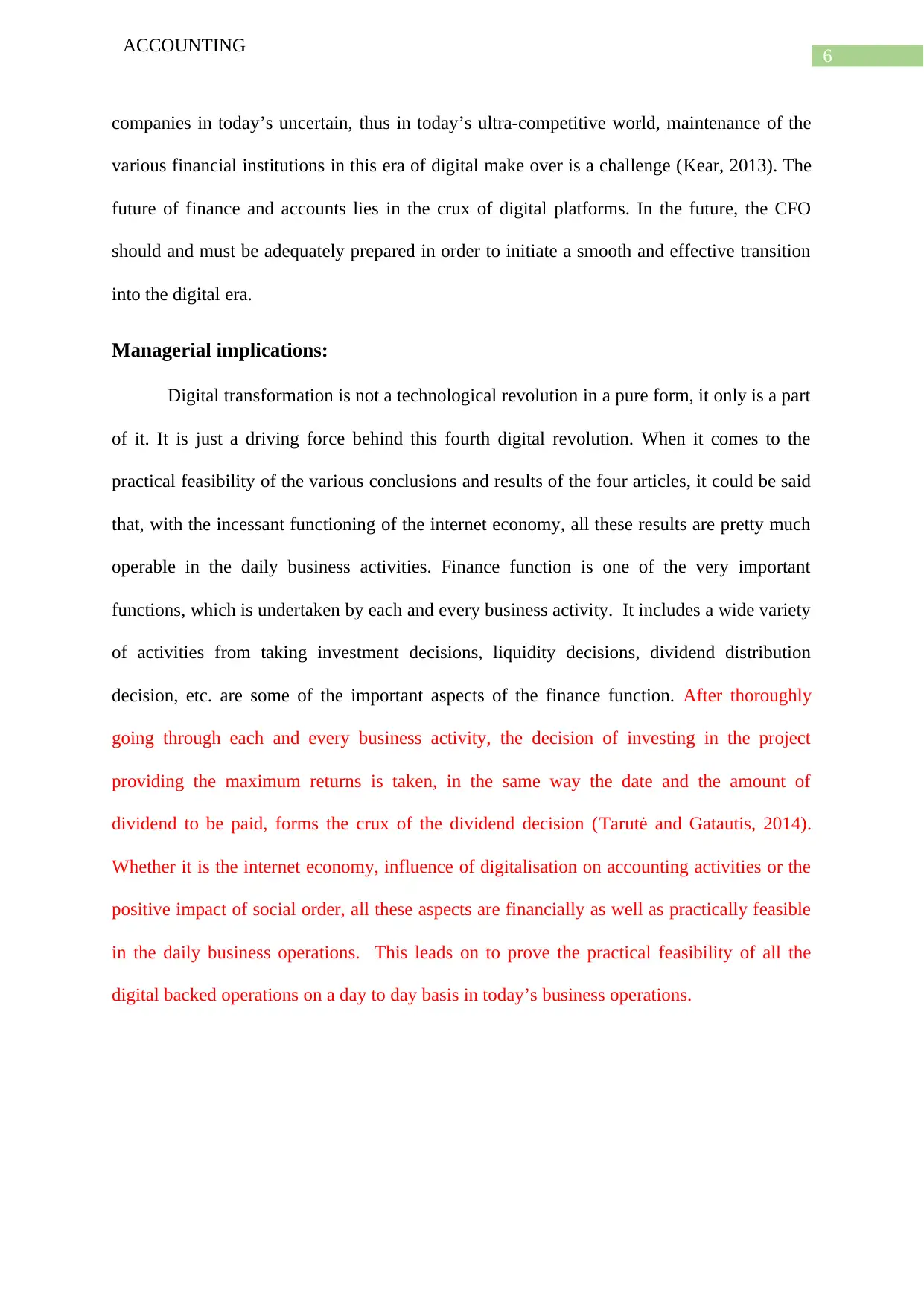
6
ACCOUNTING
companies in today’s uncertain, thus in today’s ultra-competitive world, maintenance of the
various financial institutions in this era of digital make over is a challenge (Kear, 2013). The
future of finance and accounts lies in the crux of digital platforms. In the future, the CFO
should and must be adequately prepared in order to initiate a smooth and effective transition
into the digital era.
Managerial implications:
Digital transformation is not a technological revolution in a pure form, it only is a part
of it. It is just a driving force behind this fourth digital revolution. When it comes to the
practical feasibility of the various conclusions and results of the four articles, it could be said
that, with the incessant functioning of the internet economy, all these results are pretty much
operable in the daily business activities. Finance function is one of the very important
functions, which is undertaken by each and every business activity. It includes a wide variety
of activities from taking investment decisions, liquidity decisions, dividend distribution
decision, etc. are some of the important aspects of the finance function. After thoroughly
going through each and every business activity, the decision of investing in the project
providing the maximum returns is taken, in the same way the date and the amount of
dividend to be paid, forms the crux of the dividend decision (Tarutė and Gatautis, 2014).
Whether it is the internet economy, influence of digitalisation on accounting activities or the
positive impact of social order, all these aspects are financially as well as practically feasible
in the daily business operations. This leads on to prove the practical feasibility of all the
digital backed operations on a day to day basis in today’s business operations.
ACCOUNTING
companies in today’s uncertain, thus in today’s ultra-competitive world, maintenance of the
various financial institutions in this era of digital make over is a challenge (Kear, 2013). The
future of finance and accounts lies in the crux of digital platforms. In the future, the CFO
should and must be adequately prepared in order to initiate a smooth and effective transition
into the digital era.
Managerial implications:
Digital transformation is not a technological revolution in a pure form, it only is a part
of it. It is just a driving force behind this fourth digital revolution. When it comes to the
practical feasibility of the various conclusions and results of the four articles, it could be said
that, with the incessant functioning of the internet economy, all these results are pretty much
operable in the daily business activities. Finance function is one of the very important
functions, which is undertaken by each and every business activity. It includes a wide variety
of activities from taking investment decisions, liquidity decisions, dividend distribution
decision, etc. are some of the important aspects of the finance function. After thoroughly
going through each and every business activity, the decision of investing in the project
providing the maximum returns is taken, in the same way the date and the amount of
dividend to be paid, forms the crux of the dividend decision (Tarutė and Gatautis, 2014).
Whether it is the internet economy, influence of digitalisation on accounting activities or the
positive impact of social order, all these aspects are financially as well as practically feasible
in the daily business operations. This leads on to prove the practical feasibility of all the
digital backed operations on a day to day basis in today’s business operations.
Paraphrase This Document
Need a fresh take? Get an instant paraphrase of this document with our AI Paraphraser
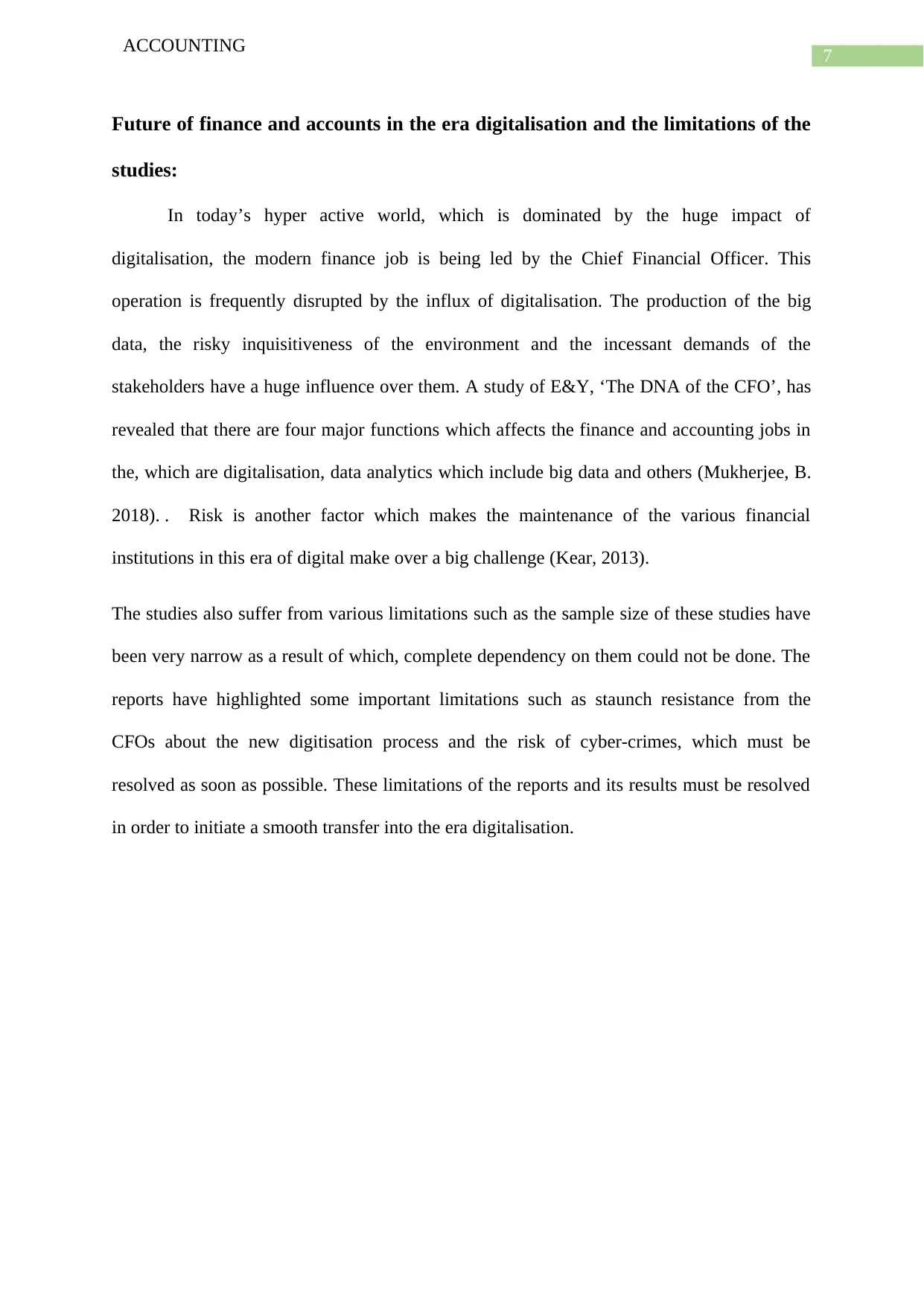
7
ACCOUNTING
Future of finance and accounts in the era digitalisation and the limitations of the
studies:
In today’s hyper active world, which is dominated by the huge impact of
digitalisation, the modern finance job is being led by the Chief Financial Officer. This
operation is frequently disrupted by the influx of digitalisation. The production of the big
data, the risky inquisitiveness of the environment and the incessant demands of the
stakeholders have a huge influence over them. A study of E&Y, ‘The DNA of the CFO’, has
revealed that there are four major functions which affects the finance and accounting jobs in
the, which are digitalisation, data analytics which include big data and others (Mukherjee, B.
2018). . Risk is another factor which makes the maintenance of the various financial
institutions in this era of digital make over a big challenge (Kear, 2013).
The studies also suffer from various limitations such as the sample size of these studies have
been very narrow as a result of which, complete dependency on them could not be done. The
reports have highlighted some important limitations such as staunch resistance from the
CFOs about the new digitisation process and the risk of cyber-crimes, which must be
resolved as soon as possible. These limitations of the reports and its results must be resolved
in order to initiate a smooth transfer into the era digitalisation.
ACCOUNTING
Future of finance and accounts in the era digitalisation and the limitations of the
studies:
In today’s hyper active world, which is dominated by the huge impact of
digitalisation, the modern finance job is being led by the Chief Financial Officer. This
operation is frequently disrupted by the influx of digitalisation. The production of the big
data, the risky inquisitiveness of the environment and the incessant demands of the
stakeholders have a huge influence over them. A study of E&Y, ‘The DNA of the CFO’, has
revealed that there are four major functions which affects the finance and accounting jobs in
the, which are digitalisation, data analytics which include big data and others (Mukherjee, B.
2018). . Risk is another factor which makes the maintenance of the various financial
institutions in this era of digital make over a big challenge (Kear, 2013).
The studies also suffer from various limitations such as the sample size of these studies have
been very narrow as a result of which, complete dependency on them could not be done. The
reports have highlighted some important limitations such as staunch resistance from the
CFOs about the new digitisation process and the risk of cyber-crimes, which must be
resolved as soon as possible. These limitations of the reports and its results must be resolved
in order to initiate a smooth transfer into the era digitalisation.
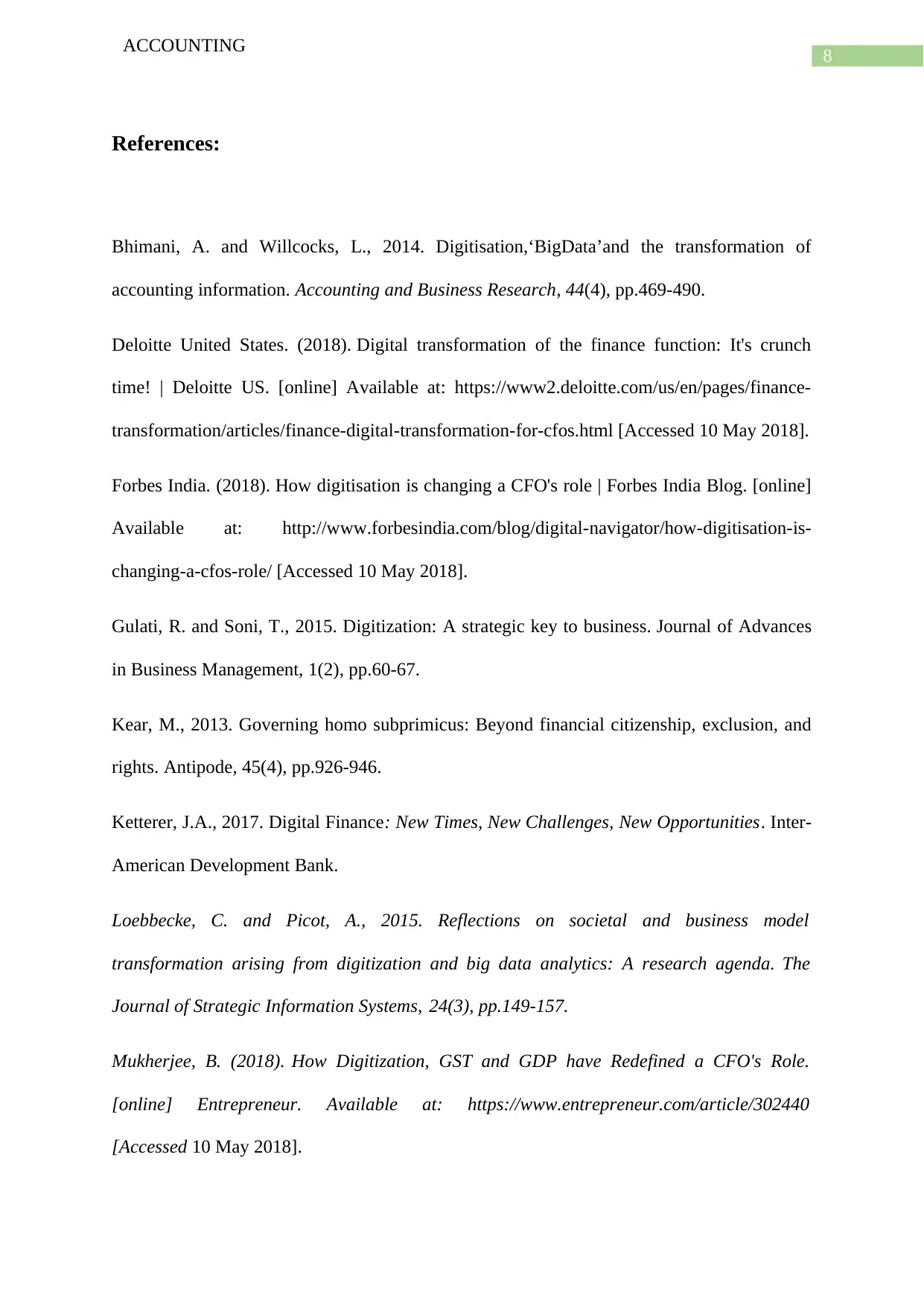
8
ACCOUNTING
References:
Bhimani, A. and Willcocks, L., 2014. Digitisation,‘BigData’and the transformation of
accounting information. Accounting and Business Research, 44(4), pp.469-490.
Deloitte United States. (2018). Digital transformation of the finance function: It's crunch
time! | Deloitte US. [online] Available at: https://www2.deloitte.com/us/en/pages/finance-
transformation/articles/finance-digital-transformation-for-cfos.html [Accessed 10 May 2018].
Forbes India. (2018). How digitisation is changing a CFO's role | Forbes India Blog. [online]
Available at: http://www.forbesindia.com/blog/digital-navigator/how-digitisation-is-
changing-a-cfos-role/ [Accessed 10 May 2018].
Gulati, R. and Soni, T., 2015. Digitization: A strategic key to business. Journal of Advances
in Business Management, 1(2), pp.60-67.
Kear, M., 2013. Governing homo subprimicus: Beyond financial citizenship, exclusion, and
rights. Antipode, 45(4), pp.926-946.
Ketterer, J.A., 2017. Digital Finance: New Times, New Challenges, New Opportunities. Inter-
American Development Bank.
Loebbecke, C. and Picot, A., 2015. Reflections on societal and business model
transformation arising from digitization and big data analytics: A research agenda. The
Journal of Strategic Information Systems, 24(3), pp.149-157.
Mukherjee, B. (2018). How Digitization, GST and GDP have Redefined a CFO's Role.
[online] Entrepreneur. Available at: https://www.entrepreneur.com/article/302440
[Accessed 10 May 2018].
ACCOUNTING
References:
Bhimani, A. and Willcocks, L., 2014. Digitisation,‘BigData’and the transformation of
accounting information. Accounting and Business Research, 44(4), pp.469-490.
Deloitte United States. (2018). Digital transformation of the finance function: It's crunch
time! | Deloitte US. [online] Available at: https://www2.deloitte.com/us/en/pages/finance-
transformation/articles/finance-digital-transformation-for-cfos.html [Accessed 10 May 2018].
Forbes India. (2018). How digitisation is changing a CFO's role | Forbes India Blog. [online]
Available at: http://www.forbesindia.com/blog/digital-navigator/how-digitisation-is-
changing-a-cfos-role/ [Accessed 10 May 2018].
Gulati, R. and Soni, T., 2015. Digitization: A strategic key to business. Journal of Advances
in Business Management, 1(2), pp.60-67.
Kear, M., 2013. Governing homo subprimicus: Beyond financial citizenship, exclusion, and
rights. Antipode, 45(4), pp.926-946.
Ketterer, J.A., 2017. Digital Finance: New Times, New Challenges, New Opportunities. Inter-
American Development Bank.
Loebbecke, C. and Picot, A., 2015. Reflections on societal and business model
transformation arising from digitization and big data analytics: A research agenda. The
Journal of Strategic Information Systems, 24(3), pp.149-157.
Mukherjee, B. (2018). How Digitization, GST and GDP have Redefined a CFO's Role.
[online] Entrepreneur. Available at: https://www.entrepreneur.com/article/302440
[Accessed 10 May 2018].
⊘ This is a preview!⊘
Do you want full access?
Subscribe today to unlock all pages.

Trusted by 1+ million students worldwide
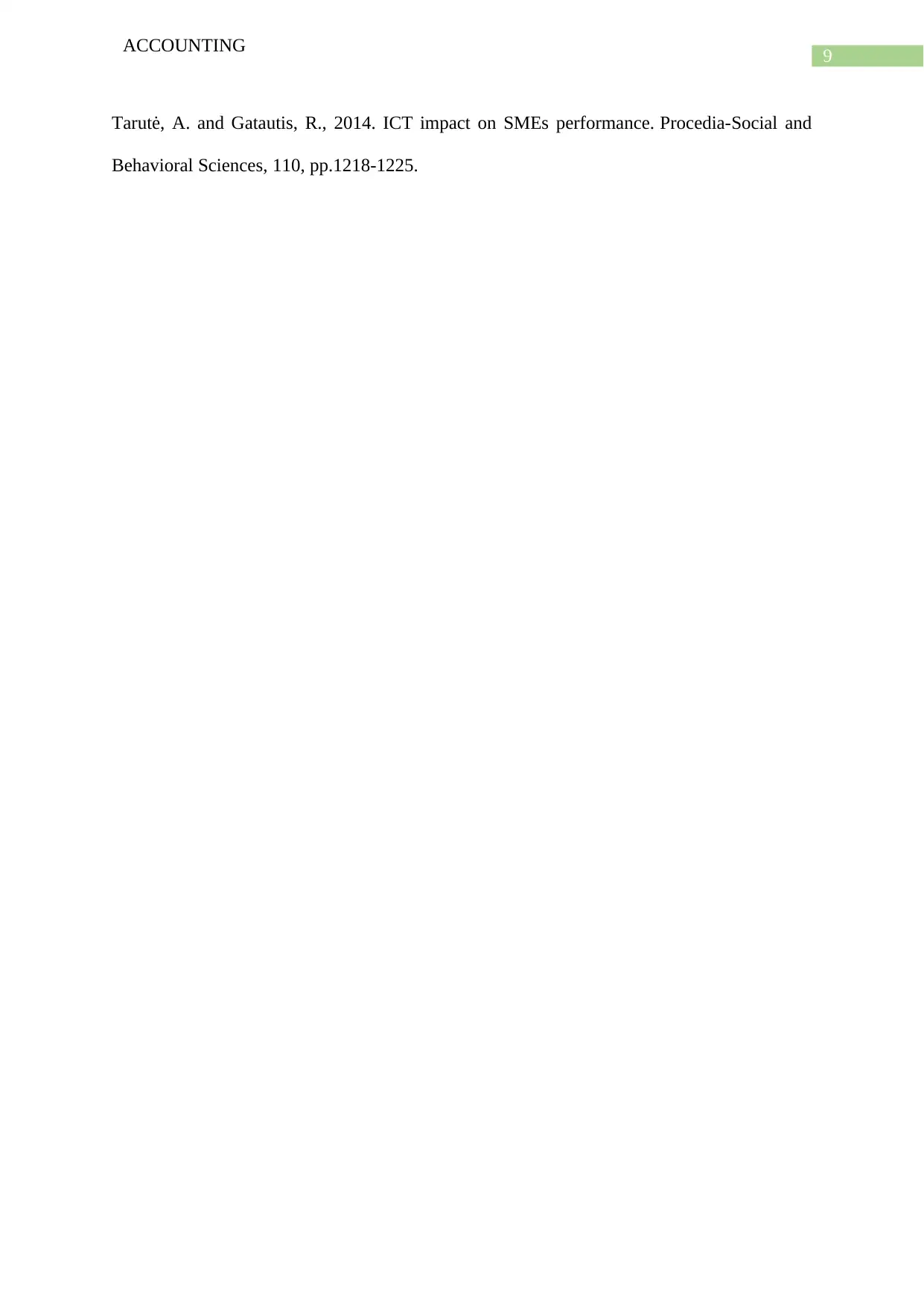
9
ACCOUNTING
Tarutė, A. and Gatautis, R., 2014. ICT impact on SMEs performance. Procedia-Social and
Behavioral Sciences, 110, pp.1218-1225.
ACCOUNTING
Tarutė, A. and Gatautis, R., 2014. ICT impact on SMEs performance. Procedia-Social and
Behavioral Sciences, 110, pp.1218-1225.
1 out of 10
Related Documents
Your All-in-One AI-Powered Toolkit for Academic Success.
+13062052269
info@desklib.com
Available 24*7 on WhatsApp / Email
![[object Object]](/_next/static/media/star-bottom.7253800d.svg)
Unlock your academic potential
Copyright © 2020–2026 A2Z Services. All Rights Reserved. Developed and managed by ZUCOL.




